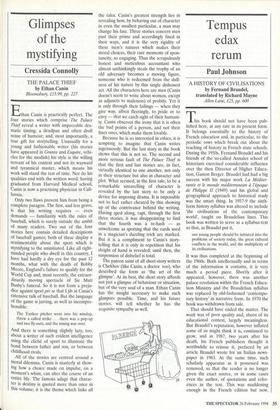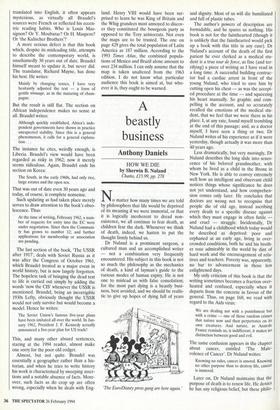Tempus edax rerum
Paul Johnson
A HISTORY OF CIVILISATIONS by Fernand Braudel, translated by Richard Mayne Allen Lane, £25, pp. 600 This book should not have been pub- lished here, at any rate in its present form. It belongs essentially to the history of French education and, in particular, to the periodic rows which break out about the teaching of history in French state schools. During the 1950s, Fernand Braudel and his friends of the so-called Annales school of historians exercised considerable influence over the then Director of Higher Educa- tion, Gaston Berger. Braude] had had a big success with his major work La Mediter- ranee et le monde mediterranean a repoque de Philippe II (1949) and his global and geographical approach to historical study was the smart thing. In 1957-9 the sixth- form history syllabus was altered to include 'the civilisations of the contemporary world', taught on Braudelian lines. This book was written to serve as a syllabus-text so that, as Braudel put it,
our young people should be initiated into the problems of society today, the great cultural conflicts in the world, and the multiplicity of its civilisations.
It was thus completed at the beginning of the 1960s. Both intellectually and in terms of the information it contains, it is very much a period piece. Shortly after it appeared, however, there was another palace revolution within the French Educa- tion Ministry and the Braudelian syllabus was replaced by old-fashioned 'contempo- rary history' in narrative form. In 1970 the book was withdrawn from sale.
That should have ended the matter. The work was of poor quality and, shorn of its educational context, largely meaningless. But Braudel's reputation, however inflated some of us might think it is, continued to grow, and in 1987, two years after his death, his French publishers thought it worthwhile to reissue it, prefaced by an article Braudel wrote for an Italian news- paper in 1983. At the same time, such scholarly apparatus as it possessed was removed, so that the reader is no longer given the exact source, or in some cases even the author, of quotations and refer- ences in the text. This was maddening enough in the French edition but now, translated into English, it often appears mysterious, as virtually all Braudel's sources were French or reflected his eccen- tric reading habits. Who is Louis Mas- signon? Or Y. Moubarac? Or H. Maspero? Or 'the Kulischer Brothers'?
A more serious defect is that this book which, despite its misleading title, attempts to describe the contemporary world, is unashamedly 30 years out of date. Braudel himself meant to update it, but never did. The translator, Richard Mayne, has done his best. He writes:
Mainly by changing tenses, I have very hesitantly adjusted the text — a form of gentle remuage, as in the maturing of cham- pagne.
But the result is still flat. The section on African independence makes no sense at all. Braudel writes:
Although quickly established, Africa's inde- pendent governments have shown in practice unexpected stability. Since this is a general phenomenon, it calls for a general explana- tion . . .
The instance he cites, weirdly enough, is Liberia. Braudel's view would have been regarded as risky in 1962; now it merely seems ridiculous. Again, Braudel ends his section on Korea:
The South, in the early 1960s, had only rice, large estates and the open sea.
That was out of date even 30 years ago and today, of course, is complete nonsense.
Such updating as had taken place merely serves to draw attention to the book's obso- lescence. Thus:
At the time of writing, February 1962, a num- ber of requests for entry into the EC were under negotiation. Since then the Communi- ty has grown to number 12; and further applications for membership or association are pending.
The last section of the book, 'The USSR after 1917', deals with Soviet Russia as it was after the Congress of October 1961, which Braudel treated as a major event in world history, but is now largely forgotten. The hopeless task of bringing the dead text to life is carried out simply by adding the words 'now the CIS' whenever the USSR is mentioned. Braudel, being an incorrigible 1930s Lefty, obviously thought the USSR would not only survive but would become a model. Hence he writes:
The Soviet Union's famous five-year plans have been imitated all over the world. In Jan- uary 1962, President J. F. Kennedy actually announced a five-year plan for US trade!
This, and many other absurd sentences, staring at the 1994 reader, almost make one sorry for the poor old codger.
Almost, but not quite. Braudel was essentially a geographer rather than a his- torian, and when he tries to write history his work is characterised by sweeping asser- tions and a notable absence of facts. More- over, such facts as do crop up are often wrong, especially when he deals with Eng- land. Henry VIII would have been sur- prised to learn he was King of Britain and the Whig grandees most annoyed to discov- er they constituted the bourgeois party as opposed to the Tory aristocrats. Not even the maps are to be trusted. The one on page 429 gives the total population of Latin America as 187 million. According to the 1993 Times Atlas, the combined popula- tions of Mexico and Brazil alone amount to over 234 million. I can only assume that the map is taken unaltered from the 1963 edition. I do not know what particular audience this book is aimed at, but who- ever it is, they ought to be warned.



























































 Previous page
Previous page